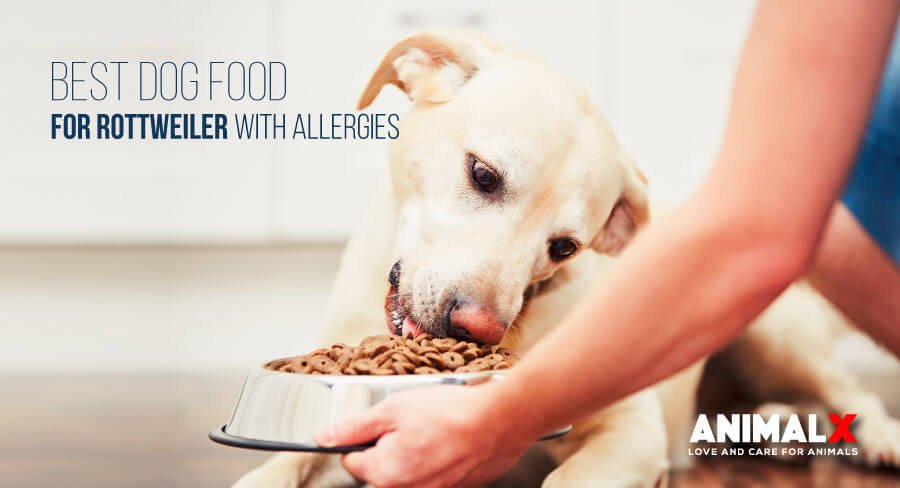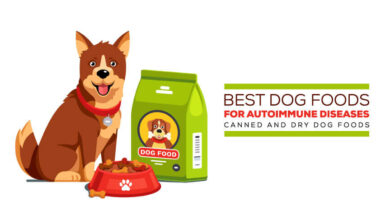Best Dog Food for Rottweiler with Allergies – A Veterinarian’s Guide
When your beloved Rottweiler is suffering from allergies, finding the right dog food becomes a crucial aspect of their care. As responsible pet owners, it’s essential to prioritize their health and well-being. In this comprehensive guide, written by a veterinarian, we’ll delve into the world of allergies in Rottweilers, explain how to identify the allergens and provide detailed insights into choosing the best dog food for your furry friend’s unique needs.
Understanding Rottweiler Allergies
Rottweilers, like all dogs, can develop allergies, which are an overreactive response of the immune system to certain substances. These substances, called allergens, can be found in the environment, inhaled, ingested, or come into contact with your dog’s skin. Understanding Rottweiler allergies involves recognizing the common signs and symptoms that indicate your dog might be suffering from an allergic reaction.
Common Signs and Symptoms:
- Itching and Scratching: One of the most common signs, excessive itching, and scratching can result in red, irritated skin and even hair loss.
- Ear Infections: Allergies can lead to ear infections characterized by itching, redness, and discharge.
- Gastrointestinal Issues: Allergies can also manifest as digestive problems such as vomiting, diarrhea, or flatulence.
- Watery Eyes and Sneezing: Environmental allergens might cause symptoms similar to hay fever in humans, including watery eyes, sneezing, and nasal discharge.
- Licking and Chewing Paws: Dogs may lick or chew their paws excessively if they are experiencing allergies, leading to further irritation and even infections.
- Hot Spots: These are areas of inflamed, irritated skin that can develop due to constant itching and licking.
- Change in Behavior: Some dogs might become lethargic, irritable, or exhibit behavioral changes due to the discomfort caused by allergies.
Identifying Allergens:
Identifying the specific allergens triggering your Rottweiler’s allergies is a crucial step in effectively managing their condition. Veterinary professionals use various methods to identify allergens and determine the appropriate course of action.
Allergy Testing:
- Skin Tests: Similar to human allergy tests, these involve exposing your dog’s skin to small amounts of potential allergens and observing the reactions.
- Blood Tests: Blood tests measure the levels of antibodies to different allergens in your dog’s bloodstream. This can provide insight into which allergens your dog might be sensitized to.
Elimination Diets:
- Novel Protein Diets: These diets contain proteins your dog has never been exposed to before, helping to pinpoint specific protein allergies.
- Hydrolyzed Diets: These diets contain proteins that have been broken down into tiny fragments, reducing the likelihood of triggering an allergic reaction.
Environmental Allergen Identification:
- Environmental Triggers: Identifying allergens like pollen, dust mites, molds, or certain plants can involve observing patterns of symptoms and exposure to different environments.
Food Allergen Identification:
- Food Trials: Your veterinarian might recommend a strict food trial where your dog is only fed a hypoallergenic diet to determine if food allergies are the root cause.
Combining Methods:
- Comprehensive Approach: Often, a combination of methods is used to identify allergens accurately. This could involve both allergy testing and elimination diets.
Identifying allergens can be a complex process, and it’s important to work closely with your veterinarian. They will help you interpret the test results, consider your dog’s history and symptoms, and create a tailored plan to manage your Rottweiler allergies effectively.
Best Dog Food for Rottweiler with Allergies
| Topic | Understanding Rottweiler Allergies | Identifying Allergens |
|---|---|---|
| What Are Allergies? | Overreactive immune response to allergens causing symptoms. | Identifying substances triggering allergic reactions. |
| Common Symptoms | Itching, scratching, ear infections, GI issues, watery eyes, sneezing, licking paws, hot spots, behavior changes. | Observing patterns of symptoms for environmental triggers. Allergy testing methods: skin tests and blood tests. |
| Provides insights into sensitivities to different allergens. | ||
| Key Considerations | Recognizing signs, and understanding how allergens affect dogs. | Using elimination diets: a novel protein, hydrolyzed diets. Combining methods for comprehensive allergen identification. |
| Why Identifying Allergens? | Accurate diagnosis and tailored treatment for effective management. | Pinpoint triggers to avoid or manage them effectively. |
| Allergy Testing | Skin tests expose the skin to allergens, blood tests measure antibodies. | |
| Environmental Allergens | Pollen, dust mites, molds, plants. | Environmental trigger identification involves observation. |
| Food Allergens | Food trials, hypoallergenic diets. | Strict food trials help identify food allergens. |
| Vet’s Role | Important in guiding diagnosis, treatment, and management. | Interpreting test results, considering history and symptoms. |
| Collaboration | Working closely with a veterinarian for accurate assessment. | Developing a tailored plan combining methods for accurate allergen identification. |

Crafting an Allergy-Friendly Diet
This section delves into the heart of the matter: choosing the right dog food for your Rottweiler with allergies. We’ll discuss various dietary considerations, including limited ingredient diets, hypoallergenic formulas, and single protein source diets. We’ll explore the pros and cons of grain-free options while emphasizing the importance of balanced nutrition.
- Limited Ingredient Diets (LID): Explanation of LID and how they work for dogs with allergies. Benefits of simplifying the diet to minimize potential allergens.
- Hypoallergenic Formulas: Detailed information on hypoallergenic dog foods, their purpose, and how they usually contain novel protein and carbohydrate sources to reduce allergen exposure.
- Single Protein Source Diets: Elaboration on why single protein source diets are beneficial for identifying allergens. Examples of different protein sources that could be used.
- Grain-Free vs. Grain-Inclusive: A balanced discussion of the controversy surrounding grain-free diets, including their potential benefits and risks. Suggestion to consider individual dog needs and consult a vet.
Navigating Ingredient Labels
Deciphering ingredient labels can be daunting, but in this section, we’ll break down the common allergens found in dog food. We’ll empower readers with the knowledge to identify potential triggers, such as chicken, beef, dairy, wheat, soy, and corn. Understanding ingredient labels is a crucial step toward selecting the right food for your allergic Rottweiler.
- Common Allergens: In-depth explanation of each common allergen, discussing why they might trigger allergies and where they are typically found in dog food ingredients.
- Reading Labels: Tips for reading and interpreting dog food labels effectively, including understanding ingredient order and the importance of looking for explicit ingredient names.
- Hidden Allergens: Mention of hidden sources of allergens that might not be immediately obvious on the label (e.g., by-products, fillers, artificial additives).
Read More: Things to Consider When Choosing Raw Food for Your Cat
Consultation with Your Veterinarian
No guide would be complete without highlighting the importance of veterinary guidance. We’ll stress the significance of consulting a veterinarian throughout the process. From allergy testing to designing a tailored diet plan, a veterinarian’s expertise is indispensable in ensuring your Rottweiler’s health and comfort.
- Professional Expertise: Emphasize the importance of partnering with a veterinarian to manage your dog’s allergies effectively.
- Allergy Testing: Explanation of various allergy testing methods, including skin tests and blood tests, and their role in identifying allergens.
- Customized Diet Plan: How veterinarians can create a tailored diet plan based on allergy test results and individual dog needs.
Transitioning to a New Diet
Changing your Rottweiler’s diet requires a gradual and careful approach. In this section, we’ll provide a step-by-step guide to transitioning your dog to a new food. We’ll also discuss the importance of observation during this transition period to monitor for any adverse reactions and ensure a smooth dietary shift.
- Gradual Transition: Detailed steps for gradually introducing the new diet to your Rottweiler, preventing digestive upset, and promoting a smooth change.
- Observation Period: The significance of closely monitoring your dog’s reactions during the transition, including how to track changes in behavior, skin condition, and overall well-being.
Homemade and Raw Diets
Some pet owners consider homemade or raw diets for their allergic Rottweilers. While these diets have their benefits, they also present challenges. We’ll discuss the pros and cons of homemade and raw diets, emphasizing the necessity of proper planning, balance, and consultation with a veterinarian.
- Benefits and Risks: Discussion of the potential benefits of homemade and raw diets for allergic dogs, balanced with the risks and challenges associated with these diets.
- Balancing Nutritional Needs: The importance of ensuring that homemade or raw diets meet all of your dog’s nutritional requirements. Mention of consulting a veterinary nutritionist.
Read More: How to Boil Chicken Breast for Dogs?
Monitoring and Adjusting
The journey doesn’t end with the selection of allergy-friendly dog food. Regular monitoring and potential adjustments are crucial to ensure your Rottweiler’s allergies are managed effectively. In this section, we’ll guide readers on how to assess their dog’s progress and make necessary changes to the diet as needed.
- Regular Check-ins: The need for ongoing monitoring, even after successfully transitioning to an allergy-friendly diet, to ensure that allergies are managed effectively.
- Potential Changes: Indications that a diet adjustment might be necessary, including worsening symptoms or a lack of improvement.
A Happy and Allergy-Free Rottweiler
In the final section, we’ll wrap up the guide by reiterating the key takeaways. We’ll emphasize the role of a well-chosen, allergy-friendly diet in ensuring your Rottweiler’s health, comfort, and overall quality of life. By following the advice of a veterinarian and staying attentive to your dog’s needs, you can provide the best care for your allergic Rottweiler.
- Recap of Key Points: Summarize the main takeaways from the guide, emphasizing the importance of a well-chosen diet in managing allergies.
- Vet’s Role: Reiterate the vital role that a veterinarian plays in guiding pet owners through the process of selecting and implementing an allergy-friendly diet.
- Quality of Life: Conclude by highlighting how the right diet can lead to an allergy-free and happier life for your Rottweiler, fostering their overall health and well-being.
Conclusion
Remember to expand on these points, provide practical examples, and include any relevant scientific information or studies to support your recommendations. Additionally, make sure to maintain a reader-friendly tone and structure for easy comprehension.



